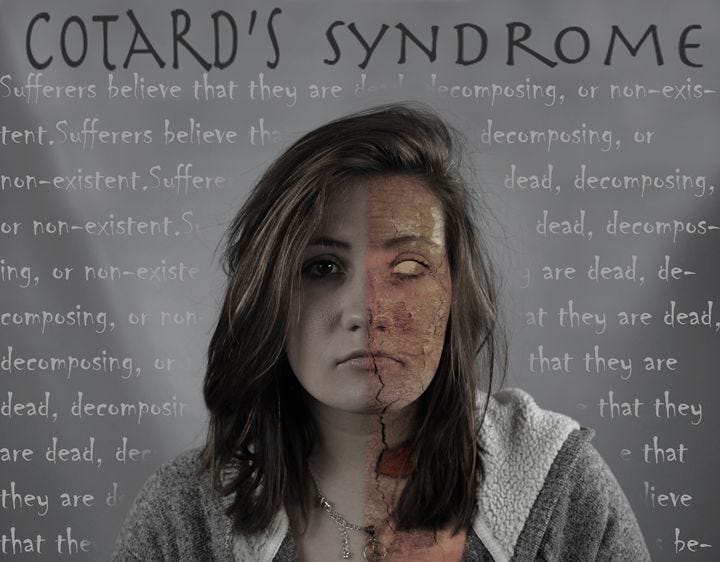Imagine feeling as though you are dead, that your organs no longer function, or even that you don’t exist.
This chilling belief is the reality for those suffering from Cotard’s Syndrome, a rare and perplexing mental health disorder also known as “Walking Corpse Syndrome.”
While it sounds like something out of a horror movie, Cotard’s Syndrome is a serious condition that can deeply affect a person’s perception of themselves and the world around them. Understanding this condition is key to providing the right care and intervention for those afflicted.
What is Cotard’s Syndrome?
Cotard’s Syndrome is a rare neuropsychiatric condition in which an individual believes they are dead, dying, or missing vital body parts. Named after French neurologist Jules Cotard, who first described the syndrome in the 1880s, it is often associated with delusions of negation. Those affected may feel that their organs have stopped functioning, that they are rotting, or even that they do not exist at all. This profound distortion of reality can lead to dangerous behaviors, such as refusing to eat or take care of oneself, believing that such actions are unnecessary for someone who is “already dead.”
Symptoms and Manifestations
The symptoms of Cotard’s Syndrome can vary widely in severity:
- Mild forms may involve beliefs that parts of the body are decaying or that the individual has lost their soul.
- Severe cases can involve the conviction that the person is entirely dead or non-existent.
- Additional symptoms include severe depression, anxiety, and hallucinations.
- These delusions often result in social withdrawal and self-neglect.
- In extreme cases, individuals may develop suicidal tendencies due to the belief that they are no longer living.
Causes and Risk Factors
While the exact cause of Cotard’s Syndrome remains unclear, it is often linked to other mental health conditions, such as severe depression, schizophrenia, or psychotic disorders.
Neurological issues, such as brain injury or certain types of dementia, have also been associated with the syndrome.
Further, Cotard’s Syndrome can sometimes happen following traumatic events or in conjunction with substance abuse.
Some research suggests that disruptions in the brain’s areas responsible for self-perception and emotional processing may contribute to the development of these delusions.
Treatment and Recovery
Treating Cotard’s Syndrome requires a comprehensive approach, often involving both psychiatric and neurological interventions. Antidepressants, antipsychotic medications, and mood stabilizers are commonly used to alleviate symptoms. In some cases, electroconvulsive therapy (ECT) has shown positive results, especially in patients unresponsive to medication. Cognitive Behavioral Therapy (CBT) and other forms of psychotherapy can also help individuals challenge and reframe their delusional beliefs. Early diagnosis and treatment are crucial for improving the prognosis and assisting individuals to regain a sense of reality and well-being.
Restoring Reality: How Kazmo Brain Center Helps with Cotard’s Syndrome
At Kazmo Brain Center, we understand that Cotard’s Syndrome is a rare and complex condition that can leave individuals feeling completely disconnected from reality and themselves. With the right combination of medical treatment, therapeutic interventions, and compassionate support, those suffering from this “walking corpse” delusion can begin to regain their sense of self and start the healing process. If you or someone you know is showing signs of Cotard’s Syndrome, seeking professional help is crucial. Early intervention and tailored care at Kazmo Brain Center can make a significant difference in managing the disorder and improving overall quality of life.
Read more: How Substance Abuse Can Affect Mental Health







